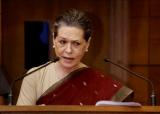

Food Bill is a ’big message’, says Sonia; seeks support of all
New Delhi, Aug 26, 2013 (PTI): Declaring Congress’ goal to "wipe out hunger and malnutrition", Sonia Gandhi today asked all political parties to set aside differences and support the Food Security Bill so that a "big message" could be sent out about India’s capabilities.
 Opening the Congress innings on the debate in Lok Sabha on Food Bill, she rejected questions over whether the country had resources to implement the landmark measure.
Opening the Congress innings on the debate in Lok Sabha on Food Bill, she rejected questions over whether the country had resources to implement the landmark measure.
"It is time to send out a big message that India can take responsibility of ensuring food security for all Indians...our goal is to wipe out hunger and malnutrition all over the country," Gandhi said about her pet agenda.
Making a strong pitch for smooth passage of the landmark legislation, the UPA Chairperson said the measure is a historic opportunity to provide food security to tens of millions of people in the country which will end the problem of hunger once for all.
She sought to dismiss questions over whether the ambitious scheme could be implemented. "The question is not whether we have enough resources or not and whether it would benefit the farmers or not. We have to arrange resources for it. We have to do it," she said in the House where Prime Minister Manmohan Singh was present.
Gandhi said farmers and agriculture have always remained priority of the UPA.
Agreeing that reforming public distribution system (PDS) was a must for the food law, Gandhi noted that there was basic need to remove the leakages to ensure that benefits of the food bill reached the intended beneficiary.
Gandhi said the Congress had made a commitment to the nation in the 2009 election manifesto to bring forward such a legislation. It is one in a series of various rights promised and provided by UPA like Right to Information, Right to Education, Right to Work and Right to Forest Produce.
Gandhi said the House got an opportunity today to take a historic step to end difficulties of the poor.
"This legislation is only a beginning. As we move forward, we will be open to constructive suggestions; we will learn from experience," she said.
In essence, she said, the country has an opportunity to transform the lives of tens of millions of our people. "I believe that we must, together, rise to the occasion, set aside our differences and affirm our commitment to their welfare and wellbeing," she said.
"It is my fervent hope and my humble appeal that we, as representatives of those very people, should convert this Bill into an Act and do so, unanimously," she said.
Gandhi said while some sections have got fruits of economic prosperity which is a matter of happiness, some sections are still deprived.
"Now the big issue before us is, what is the responsibility of government towards these people who are less fortunate than others. It is not their fault but they still live with the curse of hunger and malnutrition," she said.
The Food Security Bill is the fifth in a series of steps to provides legal entitlements to people, which puts pressure on the executive to be more responsive and accountable, and also puts in place credible mechanism to redress grievances.
"This approach, I believe, is bringing about an empowerment revolution in our country – something we are proud to have facilitated," she said.
Looking back at ten-year-long UPA rule, Gandhi said, the Government brought the Right to Information law in 2005, which has ushered in an unprecedented transparency in public life, "sometimes, to our own disadvantage".
"A little later that year, the Right to Work, Mahatma Gandhi NREGA became a reality. This has provided employment to one in four rural households in the past seven years and has led to increased rural wages," she said.
In 2006, the path-breaking Forest Rights Act came into the Statute Book. This has benefited lakhs of tribal and other families who have traditionally relied on forest for their livelihood, she said.
In 2008, the Right to Education came into being. "This has already led to a sharp increase in enrollment in schools," she added.